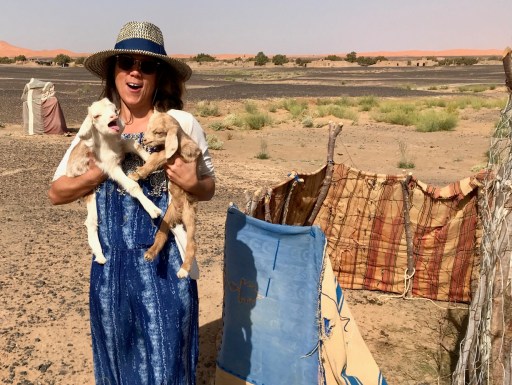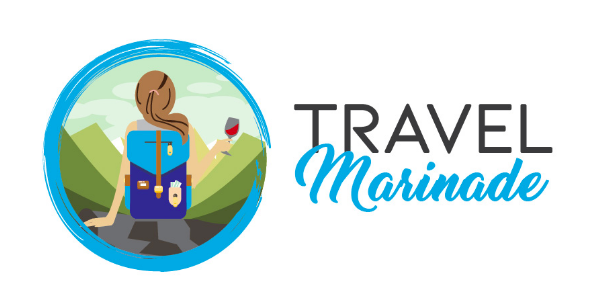Nomad is a word I used to throw around loosely, but after meeting this nomad family, I finally have a better understanding of what it means to move from place to place as a means of survival and not out of having wanderlust.
It’s been 21 days since I’ve been in the Sahara and I really haven’t seen much. I’ve been avoiding much of the tourist attractions and using my time to instead rest, read, write, and repeat.
I’m collaborating with Hsain, a former nomad and current business owner of Merzouga Dunes Luxury Camps. We’ve finally gotten past the formalities of treating me like a guest, I help myself to the kitchen for snacks whenever I want, and now we can engage in deeper conversations about the behind-the-scenes operations of running a luxury desert camp and, what I’m here to talk about today, nomad life.
I’m introduced to Mohammed, an older man with clearly defined wrinkles on his face that looks plenty hydrated.

“This man has four wives. He eats a lot of couscous at night!” Hsain points teasingly at Mohammed.
Mohammed doesn’t understand English, but I assume Hsain translates because Mohammed quickly smiles and then laughs showing me all of his yellow teeth.

“When it’s windy, they use this gas stove. When it’s not windy, they use wood fire to cook.” Hsain explains.
I see a little girl with a faux fur lined hood and bare feet running at us from a distance, but my attention is diverted when I see a couple of baby goats. They’re so cute! I know, I’m being a typical girl.

Now that I got over my animal fix, we join the nomad family for tea under an open shelter that’s shaded by tarped blankets made from wool and goat hair. I notice many of the ropes are also made from the same fur.
Mohammed pushes a small tray of nut-sized snacks for me to try and then pours each of us a round of mint tea. The tea is less sugary than I’ve had lately. I’m enjoying this cup more than the others I’ve had recently and make it a point to compliment it.

I’m sitting there and listening to my friend speak in Berber without a clue of what they’re talking about. The little girl finds us and finds a place right next to me.
I’m relishing the moment but at the same
At one point in our conversation, Hsain mentions “We have no pharmacy here. The government won’t provide us with one.”
In a way, I don’t know that they need one. I’m reminded that everything they use to treat their illnesses is natural. I asked what pregnant women do when they’re ready to give birth.
“When they’re ready to give birth, they let their people know, and then we get them comfortable and relaxed enough to have one. No hospital.” explains my friend. ‘It’s not like modern [Moroccan] women in the city who have it this way…” he points to his stomach as if he were making a slit for a C-section.
“How are the roles broken up between the men and women?” I ask.
“It’s traditional. Women take care of the house and men work outside. It’s not like modern people. It’s a lot simpler. They don’t have same problems like modern people. “
We might have a lesson or two to learn about nomad culture. Their presence feels like one of a wise man:
“At what age do they start grooming the children to start playing a more prominent role?” I start digging some more.
“Nomad children don’t have an education, you understand? They sometimes have a mobile school come by and will teach what they can, but they don’t always know when that is. The school comes when they can. “
My question wasn’t really answered but I let it go. He did further explain that sometimes there’s an opportunity for the nomad children to leave their families and get an education like he and all his brothers did.
Mohammed continues to refill my tea glass. I’m drinking it much faster than everyone else. This isn’t the first time I notice how quickly I seem to finish my tea next to Moroccans who seem to take their time and sip a lot slower.
Mohammed’s wife sits in silence off to the side and her swaddled baby is now asleep on her back. The little girl is feeling less shy and pokes me. I’m playful back putting my hand high for her to slap and then pulling the ‘down low, too slow’ move.
The ‘down low, too slow’ has a universal playfulness. I don’t know why but kids always seem to get a kick out of it. She then pulls my hand and observes my half-worn red nail polish and then puts my hand back down.
Hsain gets a call from his dad, who is still living his life as a nomad and hands the phone over to Mohammed. Mohammed puts the phone to his ear and begins talking loudly as if the recipient was a few tents away. The phone is on speaker and I don’t understand what’s being said but it sounded like a lot of teasing and a lot of laughing.
“He knew my dad from 40 years ago in Algeria as nomads.” Hsain explains.
Our pot of tea is finished and our little dish of nut-sized snacks is empty so we felt it would be a good time to leave.
We stand up, say our goodbyes, and then I’m huddled together in a group photo with the entire family. One thing I am reminded at the very end is, “Moroccans do not have poor people. Everyone has food to eat.” and this is true. There’s no reason to feel sorry for a nomad for the way that they live. If anything, I think it should be taken as a lesson conceptually as way to live.






